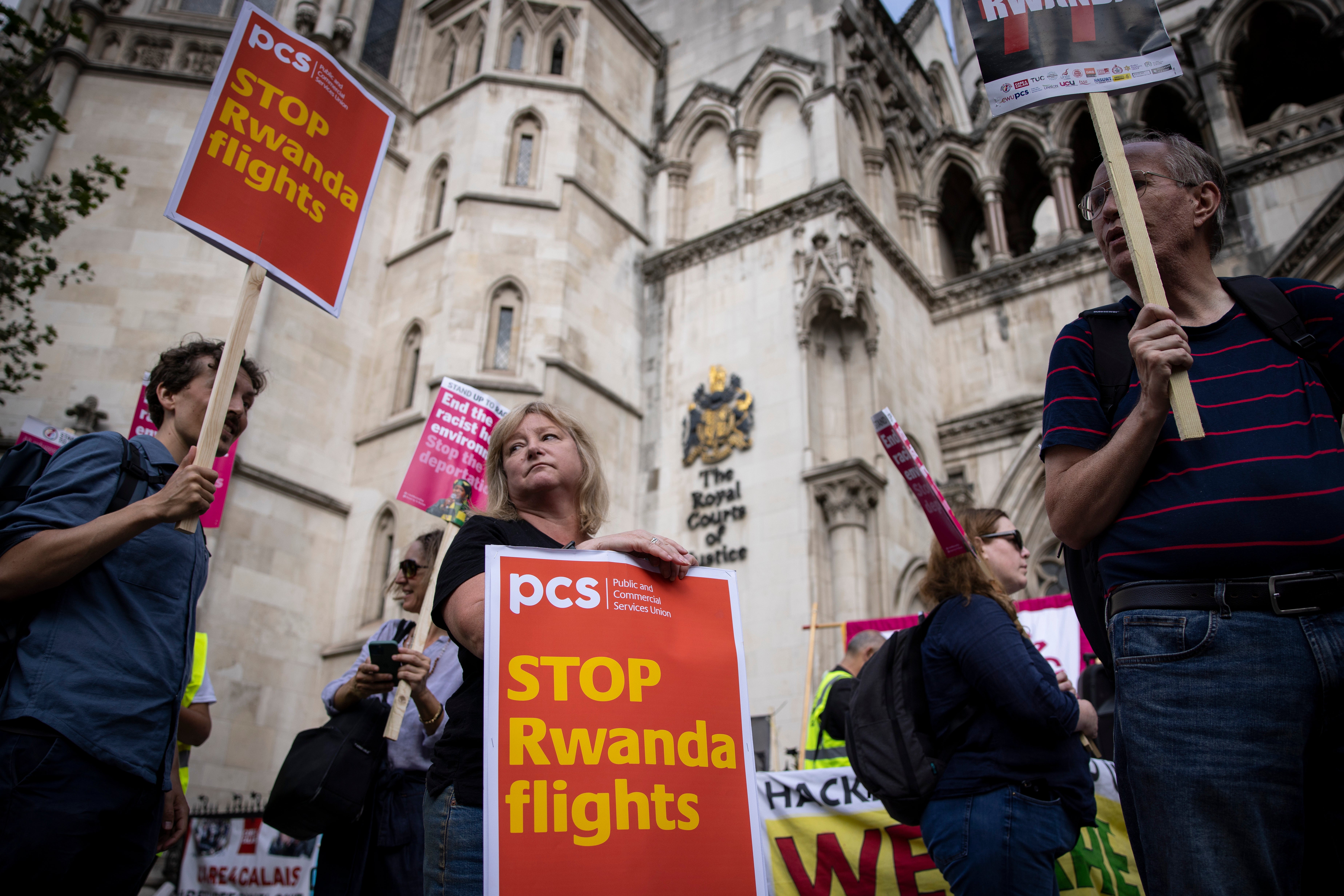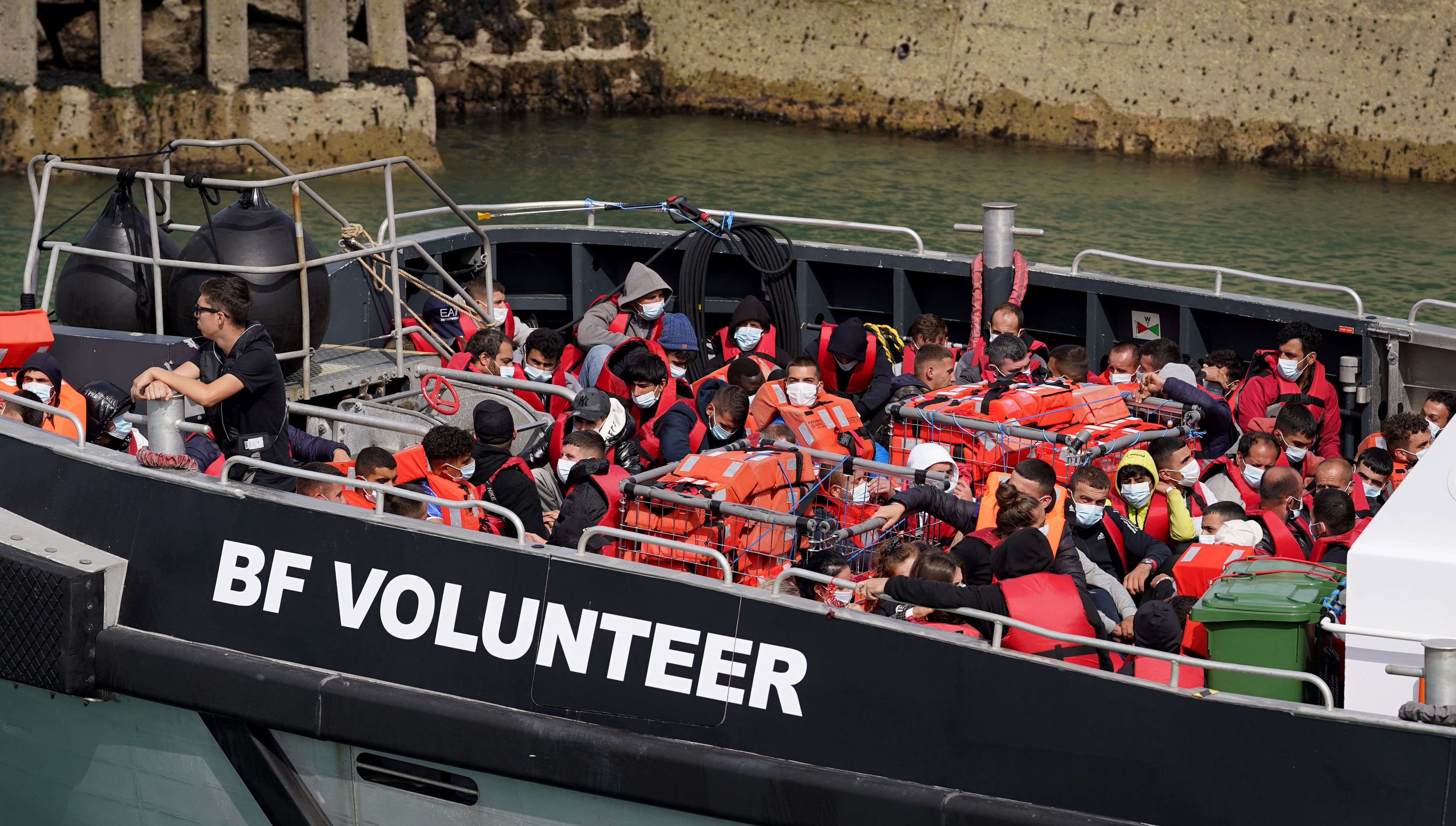Rwanda ‘not a safe third country’ for asylum seekers and UK deal must be stopped, UN tells court
UN Refugee Agency says policy amounts to the ‘unlawful penalisation’ of refugees who use small boats
Rwanda is “not a safe third country” for the transfer of asylum seekers from the UK and the agreement must not be implemented, representatives of the United Nations have said.
Giving evidence in the first High Court challenge over the deal, lawyers for the UN Refugee Council (UNHCR) said it was “not rational” to claim the opposite and that to proceed would breach the Refugee Convention.
Barrister Laura Dubinsky QC told a hearing on Tuesday that the body was “calling for an embargo and saying this should not proceed”, as its written submissions stated, “Rwanda is not a safe third country within the meaning of ... the Immigration Rules”.
The UNHCR said the deal amounts to the “unlawful penalisation” of refugees on account of their mode of arrival to the UK, and dismissed arguments by the Home Office that “relocation to a safe third country is not a criminal penalty and is not imposed as a punishment”.
Lawyers representing the home secretary said there was no blanket policy declaring Rwanda a “safe third country” and individual circumstances would be considered, although Priti Patel previously told parliament: “Rwanda is a safe and secure country with respect for the rule of law.”
Written submissions by the UNHCR pointed to government statements that asylum seekers would be selected for the scheme if they arrived “illegally by dangerous journeys”, meaning small boat crossings in the English Channel, and spent time in other countries en route to Britain.
“There is no principle in the Refugee Convention and no requirement under international law that persons fleeing persecution must claim asylum in the first safe country in which they arrive,” the UNHCR said.
“A decision to treat an asylum seeker’s claim as inadmissible on the basis that the individual arrived ‘illegally, by a dangerous journey’, with the consequence that the claim will be determined only in Rwanda, under less favourable asylum procedures, is a penalty.”
Raza Husain QC, representing a group of claimants, told the hearing that the policy was “designed to deter” by threatening refugees with being sent to a “state which does not respect human rights”.
Ms Dubinsky told the High Court that the Rwandan government had previously sent refugees to countries where they were at risk, a process known as refoulement, and that its public denials were “not supported by the evidence”.
The court heard that at least three instances of refoulement, which is a breach of the Refugee Convention, have been recorded since the UK-Rwanda agreement was signed in April.
The UNHCR said Rwanda had recently stopped asylum seekers entering the country at Kigali airport, and seized the passports of others at the request of their country of origin.
It provided evidence that during an agreement with Israel, which operated from 2014 to 2019, asylum seekers were told by Israeli authorities that they would be accommodated in a hotel and assisted to apply for asylum, but were then taken by Rwandan authorities into Uganda and prevented from making claims.

The UNHCR said denials of refoulement by the Rwandan government showed “fundamental misunderstandings of its obligations under the Refugee Convention”.
The authority also presented evidence that Rwandan authorities make “cross-checks” with asylum seekers’ countries of origin before making decisions on their claims, potentially breaching confidentiality and putting their family and associates at “serious risk of reprisal”.
Ms Dubinsky said the UNHCR was the only “independent, informed source of information before the court” on asylum processes in Rwanda, and that assurances made to the British government were “aspirational” and “non-binding and non-justiciable”.
The barrister warned that promises of increased capacity and training would not overcome “serious defects in the system”.
“Removals of asylum seekers to Rwanda under this arrangement will expose those transferred to a real risk of refoulement and a denial of other rights under the Refugee Convention,” she added.
The High Court heard that asylum applications made in Rwanda involve inadequate screening processes and interviews, without legal representation, in front of “intimidating and often hostile” panels of up to 11 people.
Interpreters are not provided if claimants can speak “a little” of one of Rwanda’s official languages or can use a friend as an informal interpreter, the UNHCR said.
Written legal submissions to the High Court said the UNHCR “warns unequivocally against the transfer of asylum seekers to Rwanda under the UK-Rwanda Arrangement” and added: “UNHCR regrets, particularly in relation to one of the founding States of the Refugee Convention, that it is necessary for it to warn that the arrangement is incompatible with UK’s fundamental obligations under the Refugee Convention.”

The document said the deal also contravenes the purpose of the convention as a “burden-shifting arrangement which will diminish overall provision of international protection and whose replication would threaten the international protection system”.
It concluded: “For all these reasons, UNHCR’s unequivocal position is that there should be no transfers of asylum seekers from the UK to Rwanda under the UK-Rwanda arrangement.”
The High Court previously heard that the country was “ruled out” of consideration for an asylum deal by the Foreign Office, but put back on the list of potentials after “particular interest” was shown by Boris Johnson and Priti Patel.
Lawyers acting for the Home Office said there was a “strong public interest in deterring” small boat crossings and had sought a safe third country “without the same attractions to migrants as the UK”.
The hearing, due to last for five days, continues.
Join our commenting forum
Join thought-provoking conversations, follow other Independent readers and see their replies
Comments


Bookmark popover
Removed from bookmarks